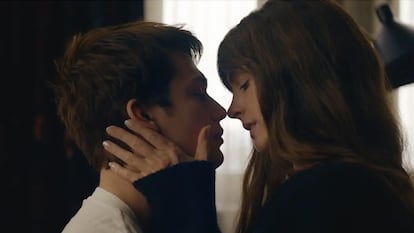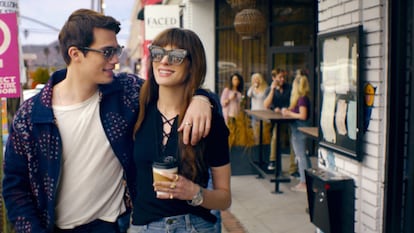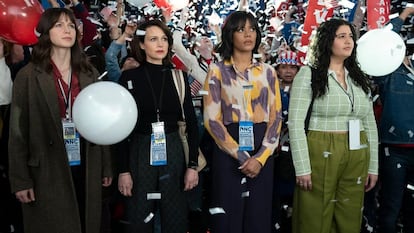Anne Hathaway, Meg Ryan and how the romantic comedy is surfing feminism’s fourth wave
The release of ‘The Idea of You’ and ‘What Happens Later’, among other films, present a return to a genre that today maintains a complex relationship with the social change and advancement that has been made when it comes to gender


In her twilight years, Nora Ephron once offered a valuable piece of advice to a new class of graduates at her alma mater, Wellesley College: “Above all, be the heroine of your life, not the victim.” The phrase is an apt summary of the latest update to her genre, the rom-com, which is perhaps not in its most illustrious moment. The director’s progenitors, Phoebe and Henry Ephron, alcoholic Hollywood screenwriters, themselves penned Desk Set (1957), in which Katharine Hepburn and Spencer Tracy brought out the iconic “Vive la difference!” line that Tracy had originated eight years earlier in George Cukor’s classic battle of the sexes tale, Adam’s Rib. The marketing campaign for Desk Set is a good indicator of all that has changed over the last nearly 70 years: “20th Century Fox presents the boys and girls that make the office such a wonderful place to love in.”
A few days ago, Meg Ryan, the genre’s muse thanks to 1980s and 1990s films that Ephron wrote or directed (When Harry Met Sally, You’ve Got Mail, Sleepless in Seattle) and a few others (French Kiss, Addicted to Love) was in Spain to promote her latest work, What Happens Later, which she co-wrote, directed and in which she stars, and that is on the brink of its Spanish premiere. What Happens Later is what one might call an autumnal rom-com, like the recent Ticket to Paradise, whose own veteran stars, Julia Roberts and George Clooney, are at each other’s throats throughout the plot. In Ryan’s film, the story centers on the accidental reencounter of a former couple (played by her and David Duchovny) who are trapped in an airport terminal. Once again, the plot seems suspended between score-settling and the melancholy of happiness lost.
In a recent interview with The New York Times, Ryan confessed that she and her daughter still love to watch Frank Capra’s classic romances. She enumerated on the actors who she feels that, even today, possess enough charm to revive the genre. Romantic comedies have a complex relationship with the social changes and advancements won by feminism’s fourth wave, which has placed a spotlight on a few of the genre’s stereotypes, which are often couched in toxic, macho romantic ideals.

Ryan Gosling and Jennifer Lawrence featured on Ryan’s list. Anne Hathaway did not, though she returns to the genre in which she rose to fame with The Idea of You, which debuts May 2 on Prime Video, and is directed by Michael Showalter and stars Nicholas Galitzine as Hathaway’s dance partner. Based on a novel by Robinne Lee, the movie tells the story of a 40-something Silver Lake gallerist who still hasn’t gotten over the husband who left her for another woman, and who appears to have put her heart on ice. But it begins to thaw when, while accompanying her teenage daughter to the Coachella festival, her life crosses paths with that of a young British man, a member of a pre-fabricated, world-famous boy band. Obviously, this spring chicken, rich and impetuous, becomes enamored of the attractive older woman.
The Idea of You chases the light acidity we expect from rom-coms, but, sadly, as occurs in so many of the genre’s films, the fairy tale would have worked much better without so much sugar. It doesn’t help that the difference in age between Hathaway (41) and Galitzine (29) is practically imperceptible. It wasn’t necessary to make another Harold and Maude (1971), Hal Ashby’s marvelous May-December romance, but it’s tough to build a romantic comedy around an age difference if its generational gap turns out to be, at first glance, this fuzzy. Returning to the classics, Cukor portrayed such a disparity to perfection in the idyll of Jacqueline Bisset and Hart Bochner in Rich and Famous (1981).
The film’s other recurring theme is public scorn, and here Hathaway, in her role as producer as well as protagonist, seems to speak more of herself than her character. It’s hard not to see her reflection in The Idea of You’s woman who discovers the impact of viral hate. The real-life story is well-known: when the performer won her Best Supporting Actress Oscar for her work in Les Misérables (2012), the news was met with disdain by the digital hordes, who unfurled what today we know as Hathahate. The Devil Wears Prada and The Princess Diaries actress had to deal with a mounting backlash that had really begun the year before, in 2011, when she hosted the Hollywood awards gala alongside James Franco, with whom she proved to have a zero-sum chemistry. The motivation of the hate? It vaguely seemed to stem from her failure to act natural, her rigid perfection and perceived search for constant approval. The mass disapproval snowballed — “a lot of people wouldn’t give me roles because they were so concerned about how toxic my identity had become online,” the actress said in a recent interview with Vanity Fair — that her name began to be considered box office poison. The pressure to reverse the situation became so suffocating that, according to the actress, she was only able to overcome it thanks to filmmaker Christopher Nolan, who brought her back for Interstellar in 2014.
The Idea of You is also part of a post-pandemic trend that puts all rom-com eggs into a single basket: that of streaming. In many countries, two of last season’s (hands down) best comedies, American Fiction and the impeccable Bottoms, were sent straight to streaming (Prime Video, in both cases) without first passing through foreign movie theaters. Still, recent hits like Anyone But You are proof of the popular appeal that the genre’s films, independent of their quality — which, in Anyone But You’s case, was not the highest — continue to possess. With Sydney Sweeney and Glen Powell heading up the cast, Anyone But You is a prototypical rom-com, with its family wedding, postcard-ready Australian sun and sand, pseudo-spicy dialogue and gym-toned physiques.

Beyond their impossible titles, which seem better suited to a teenager’s diary (What Happens Later, The Idea of You, Anyone But You), the crisis of rom-coms is also linked to an apparent drought of male actors capable of swimming the waters of a new masculinity that is less dependent on biceps as it is on a sense of humor. Meanwhile, series like The Girls on the Bus, which is in some ways a descendent of Howard Hawks’s His Girl Friday, works as a romantic comedy that plays out within the bounds of a profession, in this case journalism, that has a penchant for entanglements between the sheets. At least this HBO Max production is in keeping with Ephron’s maxim: its four leads, at least, make an effort to be the heroines of their own lives.
Sign up for our weekly newsletter to get more English-language news coverage from EL PAÍS USA Edition
Tu suscripción se está usando en otro dispositivo
¿Quieres añadir otro usuario a tu suscripción?
Si continúas leyendo en este dispositivo, no se podrá leer en el otro.
FlechaTu suscripción se está usando en otro dispositivo y solo puedes acceder a EL PAÍS desde un dispositivo a la vez.
Si quieres compartir tu cuenta, cambia tu suscripción a la modalidad Premium, así podrás añadir otro usuario. Cada uno accederá con su propia cuenta de email, lo que os permitirá personalizar vuestra experiencia en EL PAÍS.
¿Tienes una suscripción de empresa? Accede aquí para contratar más cuentas.
En el caso de no saber quién está usando tu cuenta, te recomendamos cambiar tu contraseña aquí.
Si decides continuar compartiendo tu cuenta, este mensaje se mostrará en tu dispositivo y en el de la otra persona que está usando tu cuenta de forma indefinida, afectando a tu experiencia de lectura. Puedes consultar aquí los términos y condiciones de la suscripción digital.








































